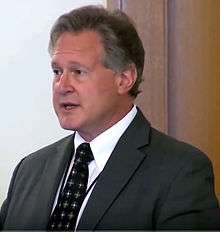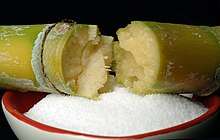Robert Lustig
Robert H. Lustig (born 1957) is an American pediatric endocrinologist. He is Professor of Pediatrics in the Division of Endocrinology at the University of California, San Francisco (UCSF), where he specializes in neuroendocrinology and childhood obesity. He is also director of UCSF's WATCH program (Weight Assessment for Teen and Child Health), and president and co-founder of the non-profit Institute for Responsible Nutrition.[4][5]
Robert H. Lustig | |
|---|---|
 Speaking in Cambridge, MA, 2013 | |
| Born | 1957 Brooklyn, New York[1] |
| Education | Bachelor's, Massachusetts Institute of Technology, 1976.[1] MD, Cornell University Medical College, 1980. Residency in pediatriacs, St. Louis Children's Hospital, 1983. Clinical fellowship in pediatric endocrinology, University of California, San Francisco Medical Center, 1984. Postdoctoral fellowship in neuroendocrinology, Rockefeller University, 1986.[2] Master of Studies in Law, University of California, Hastings College of the Law[3] |
| Medical career | |
| Profession | Clinical medical practice, teaching and research |
| Field | Neuroendocrinology, pediatric endocrinology |
| Institutions | University of California, San Francisco, UCSF Benioff Children's Hospital |
| Sub-specialties | Childhood obesity, metabolic syndrome |
| Research | Biochemical, neural, hormonal and genetic influences contributing to obesity |
| Website | Robert Lustig, MD, University of California, San Francisco |
Lustig came to public attention in 2009 when one of his medical lectures, "Sugar: The Bitter Truth," became popular on YouTube.[6][7][8][9] He is the editor of Obesity Before Birth: Maternal and Prenatal Influences on the Offspring (2010), and author of Fat Chance: Beating the Odds against Sugar, Processed Food, Obesity, and Disease (2013).
Biography
Lustig grew up in Brooklyn, New York, and attended Stuyvesant High School in Manhattan.[1] He obtained a bachelor's degree from the Massachusetts Institute of Technology in 1976 and an MD from Cornell University Medical College in 1980.[4]
His pediatric residency was completed at St. Louis Children's Hospital in 1983 and his clinical fellowship in pediatric endocrinology at UCSF the following year. After this he worked at Rockefeller University for six years as a post-doctoral fellow and research associate in neuroendocrinology. Before returning to UCSF in 2001, he was a faculty member at the University of Tennessee, Memphis, and the University of Wisconsin-Madison, and worked at St. Jude Children's Research Hospital in Memphis.[4] In 2013 he completed a Master of Studies in Law (MSL) from UC Hastings College of the Law.[3]
Lustig has authored 105 peer-reviewed articles and 65 reviews.[10] He is a former chair of the obesity task force of the Pediatric Endocrine Society, a member of the obesity task force of the Endocrine Society, and sits on the steering committee of the International Endocrine Alliance to Combat Obesity. He is married with two daughters and lives in San Francisco.[4]
Research
Lustig's research examines links between excess consumption of fructose—a component of sucrose (table sugar), honey, fruit and some vegetables—and the development of metabolic syndrome. Metabolic syndrome can include type 2 diabetes, high blood pressure, cardiovascular disease, non-alcoholic fatty liver disease, obesity and the phenomenon "TOFI" ("thin-outside-fat-inside").[11]
Lustig argues that fructose can be consumed safely within whole fruits and vegetables because of the role played by the accompanying dietary fiber. But he maintains that the liver is damaged by the fructose in table sugar and high-fructose corn syrup that are added to food and beverages (particularly convenience food and soft drinks), and by the fructose in fruit juice and vegetable juice. His position is that sugars are not simply empty calories; he rejects the idea that "a calorie is a calorie."[8][11][12]
Lustig was a co-author in 2009 of the American Heart Association's guideline on sugar intake, which recommended that women consume no more than 100 calories daily from added sugars and men no more than 150.[13] That year, a 90-minute lecture by Lustig, "Sugar: The Bitter Truth," recorded in May 2009 for University of California Television,[6] became popular on YouTube. By February 2017, the video had been viewed almost seven million times.[9] The Financial Times called it "sugar's 'tobacco' moment."[14]
In March 2015 the World Health Organization recommended that free sugars[note 1] comprise no more than ten percent of daily intake, and preferably no more than five percent (around six teaspoons or 25 grams).[15]:4[16]
Criticism
Lustig's statements on fructose metabolism and weight gain were disputed in a systematic review of clinical research on obesity and metabolic syndrome.[17]
Selected works
Books
- (2010) Obesity Before Birth: Maternal and Prenatal Influences on the Offspring. Boston: Springer Science.
- (2013) Fat Chance: Beating the Odds against Sugar, Processed Food, Obesity, and Disease. New York: Hudson Street Press.
- (2013) Sugar Has 56 Names: A Shopper's Guide, Avery.
- (2014) with Heather Millar, The Fat Chance Cookbook, Thorndike Press.
- (2017) "The Hacking of the American Mind", Avery.
Articles
- Weiss, R; Bremer, AA; Lustig, RH (2013). "What is metabolic syndrome, and why are children getting it?". Ann. N. Y. Acad. Sci. 1281: 123–40. doi:10.1111/nyas.12030. PMC 3715098. PMID 23356701.
See also
- Epidemiology of metabolic syndrome
- Epidemiology of obesity
- Fed Up (documentary featuring Lustig, 2014)
- Metabolic disorder
Notes
- World Health Organization, March 2015: "The term 'sugars' includes intrinsic sugars, which are those incorporated within the structure of intact fruit and vegetables; sugars from milk (lactose and galactose); and free sugars, which are monosaccharides and disaccharides added to foods and beverages by the manufacturer, cook or consumer, and sugars naturally present in honey, syrups, fruit juices and fruit juice concentrates."[15]:7
References
- "Robert Lustig, MD, MSL" Archived 2012-01-12 at the Wayback Machine, ConnectWell.
- Robert Lustig, MD, Benioff Children's Hospital.
- "Robert Lustig, M.D., Professor, pediatric endocrinology, UCSF", University of California, Hastings College of the Law.
- "Robert Lustig, MD", University of California, San Francisco.
- "Our team", Institute for Responsible Nutrition.
- Robert Lustig, "Sugar: The Bitter Truth", University of California Television, 26 May 2009; uploaded to YouTube 20 July 2009.
- Kate Vidinsky, "UCSF Lecture on Sugar & Obesity Goes Viral as Experts Confront Health Crisis", University of California, San Francisco, 11 March 2010.
- Gary Taube, "Is Sugar Toxic?", The New York Times, 13 April 2011.
- Ian Leslie, "The sugar conspiracy", The Guardian, 7 April 2016.
- "Robert Lustig", The Conversation.
- Lustig, Robert H.; Schmidt, Laura A.; Brindis, Claire D. (2012). "Public health: The toxic truth about sugar" (PDF). Nature. 482: 27–29. doi:10.1038/482027a. PMID 22297952.
- Lustig, RH (2013). "Fructose: it's "alcohol without the buzz"". Adv Nutr. 4: 226–35. doi:10.3945/an.112.002998. PMC 3649103. PMID 23493539.
- Johnson, RK; Appel, LJ; Brands, M; Howard, BV; Lefevre, M; Lustig, RH; Sacks, F; Steffen, LM; Wylie-Rosett, J (2009). "Dietary sugars intake and cardiovascular health: a scientific statement from the American Heart Association". Circulation. 120: 1011–20. doi:10.1161/CIRCULATIONAHA.109.192627. PMID 19704096.
- Izabella Kaminska, "Robert Lustig: godfather of the sugar tax", The Financial Times, 18 March 2016.
- Guideline: Sugars intake for adults and children, Geneva: World Health Organization, March 2015.
- "WHO calls on countries to reduce sugars intake among adults and children", World Health Organization, press release, 4 March 2015.
- Khan, T. A; Sievenpiper, J. L (2016). "Controversies about sugars: Results from systematic reviews and meta-analyses on obesity, cardiometabolic disease and diabetes". European Journal of Nutrition. 55 (Suppl 2): 25–43. doi:10.1007/s00394-016-1345-3. PMC 5174149. PMID 27900447.
External links
- Robert Lustig, MD, University of California, San Francisco.
- "Robert Lustig, Talks at Google", 2 August 2011.
- "Fat Chance: Fructose 2.0", University of California Television, 21 October 2013 (lecture by Lustig updating "Sugar: The Bitter Truth").
- Connor, Anahad. "Learning to Cut the Sugar", The New York Times, 19 February 2014 (interview).
- Donovan, John. "Sugar Wars", ABC Nightline, 18 March 2010 (interview).
- Ferdman, Roberto A. "Explained: The actual difference between sugar and high-fructose corn syrup", The Washington Post, 1 April 2015.
